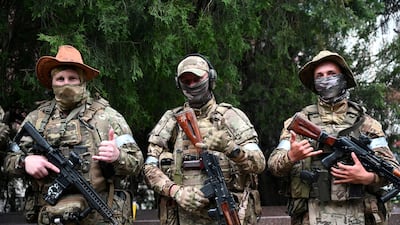Poland has detained two Russians suspected of spying and disseminating propaganda for the Wagner Group.
They are alleged to have committed the activities in the capital Warsaw and Krakow, Poland's second-largest city.
The Russian citizens were arrested on Friday over allegations of working for a foreign intelligence agency and participation in an organised group with terrorist goals. If convicted, they could face up to 10 years in prison.
“Both were charged with … espionage and arrested,” Polish Interior Minister Mariusz Kaminski said on X, formerly known as Twitter, on Monday.
He added that they were also accused of “distributing propaganda materials of the Wagner Group”.
Polish counter-intelligence agency, The Internal Security Agency, said both Russians were detained after they distributed "around 300 leaflets in public places in Krakow and Warsaw".
The leaflets contained links to "recruitment websites" for Wagner, which has played a key role in Russia's war on Ukraine.
"The Russians had on them more than 3,000 propaganda leaflets promoting the Wagner group. The material was given to them in Moscow," the agency said.
The suspects, who had planned to leave Poland on Saturday, were set to receive "up to 500,000 roubles" ($5,000) for their activities, it added.
Polish media last week reported the appearance of stickers with the Wagner logo and inscriptions in English reading “We are here – join us”, as well as QR codes redirecting readers to a Russian website about the mercenary group.
In recent months Poland has arrested 22 people suspected of spying for Russia or its ally, Belarus, in what Warsaw sees as part of a hybrid war on Poland due to its support for Ukraine.
Poland has recently warned of possible provocation from the mercenary group, which is currently based in neighbouring Belarus, and said it would in response increase troop levels at the border between the two countries, to 10,000.
However, in recent days reports have indicated Wagner fighters are returning to Russia from Belarus in large numbers, suggesting a deal to harbour the group has collapsed.
The deal was brokered after Wagner mercenaries staged a mutiny in Russia in June over grievances with the Russian military leadership.
Wagner fighters took control of the city of Rostov-on-Don and were heading towards Moscow until they were persuaded to withdraw and relocate to Belarus.
This month Poland said it was working towards the “complete isolation” of Belarus, after it accused the country of carrying out military provocation on its border, including an incursion by two helicopters.
Nato member Poland has been concerned about the possible spillover of war into its territory since Russia invaded Ukraine in February 2022.
Separately, Ukraine said on Monday its forces had recaptured a clutch of territory around the eastern town of Bakhmut, wresting back land taken by Russian forces this summer.
Kyiv launched a highly anticipated counter-offensive in June after building up assault battalions and stockpiling western-donated weapons but has acknowledged progress is slow.
“In the Bakhmut sector, three square kilometres were liberated last week,” Deputy Defence Minister Hanna Maliar told state television.
“In total, 40 square kilometres have been liberated on the southern flank of the Bakhmut sector,” she added.
Russian forces, spearheaded by Wagner, captured the town of about 70,000 in May after months of fierce fighting.
Ukrainian forces have also been pressing against deeply entrenched Russian forces in the south of the country, in two regions the Kremlin said it had annexed last year.
Ms Maliar said Ukrainian forces had been pushing towards the captured towns of Melitopol and Berdyansk, adding that “hostilities are continuing in Urozhaine”, a settlement on the southern front in the Donetsk region.
“We have certain successes there. Our forces also had certain successes on the south of Staromayorsk,” the minister said, referring to another nearby town.
Ms Maliar also confirmed Ukrainian troops had conducted “certain tasks” on the left bank of the Dnipro river in the Kherson region.
The river was rendered the de facto front line between Ukrainian and Russian forces in the region after Kyiv recaptured the territory's main city, also called Kherson, in November.
“We cannot reveal the details but we completed these tasks. In order to entrench there, it is necessary to dislodge the enemy and clear the territory,” Ms Maliar said.
Overnight, Ukrainian authorities said Russia launched “several waves” of drone and missile attacks, amid reports Kyiv’s troops were making advances along the front line in the country’s south.
Air defence shot down all 15 Iranian-made drones and eight Kalibr cruise missiles, Ukraine’s Air Force said on Telegram on Monday. Debris that fell on the port city of Odesa caused a fire and injured three people, according to regional governor Oleh Kiper.
On Sunday, Russian shelling killed seven people, including a 22-day-old baby, and wounded about 22 in the southern region of Kherson, prompting local officials to declare Monday a day of mourning and President Volodymyr Zelenskyy to promise justice.
The rouble meanwhile broke through the psychologically important level of 100 to the dollar for the first time since March last year.
On Monday, the Russian currency passed 101 roubles to the dollar, continuing a more than 25 per cent decline in its value since the beginning of the year and hitting its lowest level in almost 17 months.


